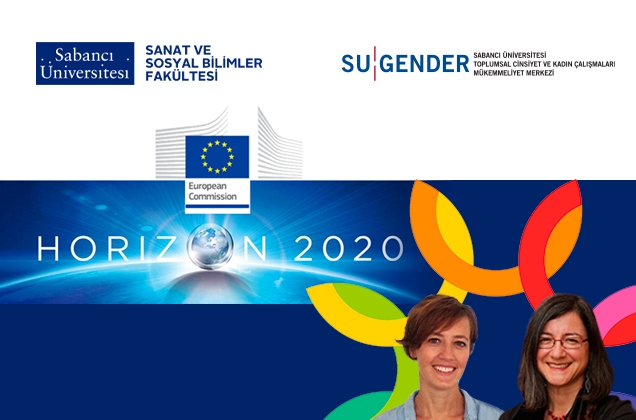13/01/2021
SU Gender is entering 2021 with four H2020 projects. As of January 2021, a new project has been added to its existing portfolio consisting of the GEARING-Roles (2019-2022) project, seeking to strengthen gender equality mechanisms, and WHOLE-COMM (2021-2025) ve Re-ROOT (2021-2024) projects, examining migration and integration at different urban scales and layers. The RESISTIRE (RESpondIng to outbreaks through co-creaTIve sustainable inclusive equality stRatEgies) project, which was ranked 5th among 162 applications, has succeeded in securing over 5.2 million Euros funding under the H2020 COVID-19 call (with a Sabancı University budget of 247.975 EUR).

RESISTIRE brings together 10 institutions from 9 countries in a strongly multi-disciplinary and multi-sector consortium, being coordinated by the European Science Foundation (ESF) and including as project partners Örebro University (Sweden), Yellow Window (Belgium), Oxford Brookes University (UK), Knowledge & Innovation (Italy), Technical University Dublin (Ireland), Sabancı University (Turkey), Universidad de Deusto (Spain), Institute of Sociology of the Academy of Sciences of the Czech Republic (Czech Republic) and Sciensano (Belgium).
The consortium integrates public health, humanities, STEM and social sciences; it is formed by a collaboration of experts from anthropology, computational anthropology, design, economics, education, employment research, environmental sciences, gender studies, health sciences, law, management science, political science, product development, psychology, social and health studies, sociology and statistics. In terms of geographic scope, the project is organized to cover 30 countries of which 8 are covered through the consortium members and 22 are covered by a network of national researchers. At Sabancı, the project will be led by Ayşe Gül Altınay ve Kristen Sarah Biehl, with Aslı İkizoğlu, Ayşecan Terzioğlu, Gülru Göker and Hülya Adak also taking part in the multi-disciplinary research team.
The overarching aim of RESISTIRE is to understand and work towards individual and societal resilience to the unequal impacts of the COVID-19 outbreak and its policy responses on behavioural, social and economic inequalities in 30 countries, by designing devising and piloting solutions for improved new policies and social innovations to be deployed by policymakers, stakeholders and actors in the field in different policy domains. As early evidence already suggests, sex and gender influence COVID-19 outcomes in multiple aspects including, differential mortality rates, uneven distribution of care whether due to lockdown measures or as healthcare professionals and rising gender-based violence. It is also known that gender differences intersect with class, age, disability and other inequalities (e.g. race/ethnicity, religion/belief, sexuality, gender identity). Therefore, in meeting the project aim, the project builds around a 'gender+' lens that both highlights gender relations/inequalities and considers how it is related to other inequalities. Analytically, RESISTIRE will draw on an intersectionality-based policy analysis framework, which has emerged to advance understandings of the differential impacts of health policies to produce inclusive and socially just health outcomes. Empirically, RESISTIRE will use the policy domains in the Gender Equality Strategy (EC 2020), fundamental human rights and environmental justice (the latter from the Beijing Platform) to focus the areas for analysis of the impact on inequalities.
The overall methodology of RESISTIRE, which will run over 24 months between 2021-2023, is based on co-creative, solution and innovation driven design-thinking. Essentially, RESISTIRE uses a participatory approach, where stakeholders and end-users are involved throughout the process and cycles, with techniques that go from consultation to co-creation. The workplan is designed to split the project into three short (6-8 month) cycles devoting time and resources to researching the impacts of the outbreak policies (including both quantitative and qualitative data), translating results into insights in order to develop operational tools through co-design workshops, disseminating knowledge, developing policy recommendations and empowering stakeholders to exploit project results.
With its multidisciplinary research team, including anthropology, sociology, political science, geography, literature, cultural studies and gender studies, SU Gender will be researching the inequalities created or deepened as a result of the pandemic in Turkey through an intersectional gender lens, examining the ways in which the most vulnerable groups in society have experienced this process, and working with all stakeholders in the field towards developing creative strategies and effective policies.




